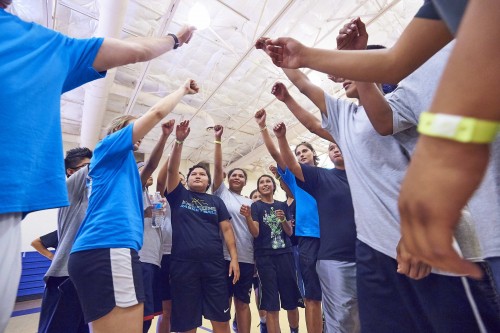
On some tribal reservations, sexual health education is not part of standardized school curriculum. Adolescents in these communities suffer high rates of sexually transmitted infection and unintended pregnancy. Focus groups completed with adolescents from a tribe in the American Southwest indicated sexual health knowledge including HIV/AIDs prevention and transmission knowledge is low, peers readily influence youth’s decision to engage in sexual risk behaviors and skills necessary to reduce risk behaviors including communication skills and proper condom use are lacking. Innovative programs that fill this educational gap and are easily transportable are essential.
About Respecting the Circle of Life
Respecting the Circle of Life is a comprehensive sexual and reproductive health program culturally adapted for American Indian communities. It provides teens with comprehensive knowledge and teaches skills to help them make healthy choices regarding sex and communication with their partners.
Respecting the Circle of Life:
- Consists of 8 sessions each lasting 90 minutes
- Is taught to small same-sex groups of friends by 2 adult facilitators
- Teaches reproduction, anatomy, prevention, and transmission of sexually transmitted infections
- Promotes problem-solving strategies and healthy communication
- Enables youth to practice condom use skills
- Prevents alcohol and drug use, especially before sex
- The Respecting the Circle of Life program is embedded in a two-week summer basketball camp. Educational sessions blend with basketballs skills training and competitive play, and provide youth with a recreational outlet that enhances overall program participation.
Results
Respecting the Circle of Life was evaluated with 534 youth aged 11-19 from a tribe in the American Southwest. Results indicate that RCL has strong evidence of effectiveness for the prevention of teen pregnancy in Native American communities.
Compared to the control group, youth who received RCL:
- Had significantly better sexual/reproductive health knowledge at both 9 and 12 months.
- Had better condom use and contraceptive use self-efficacy at both 9 and 12 months.
- Had better partner negotiation skills around condom use at 9 months, and around contraceptive use at both 9 and 12 months.
- Had significantly lower intention to have sex in the next year, and significantly higher intention to use a condom at 9 months.
- Reported significantly higher levels of communicating with parents about sexual/reproductive health at both 9 and 12 months.
Promoting Reproductive Health Equity Nationally
Beginning February 2021, the Center is disseminating RCL through ETR, a nonprofit organization that helps scale up science-based solutions in sexual and reproductive health and other areas. Communities can purchase the program through ETR’s catalog, which only includes programs with proven evidence. Respecting the Circle of Life is the first program developed for Native American communities in ETR’s catalog, where communities can access everything needed to deliver RCL to youth and their parents or trusted adults including an online, self-paced Training of Educators. This virtual training gives educators the knowledge and skills to implement the Respecting the Circle of Life curriculum effectively and with a high degree of fidelity. Educators can work through the e-learning modules at their own pace, with plenty of reinforcement and opportunities for review along the way. As part of the kit, the Center for American Indian Health created a comprehensive implementation guide including recruitment materials, camp schedules, and a month-by-month planning guide.
As a result of this training, educators will be able to:
1. Share accurate information related to:
- Key findings from student outcomes of the Respecting the Circle of Life evaluation
STD, HIV and pregnancy facts - STD, HIV and pregnancy prevention methods
- Adolescent risk behaviors for pregnancy, STD and HIV
2. Increase student proficiency to:
- Utilize assertive communication and refusal skills
- Utilize decision-making skills
- Assess short- and long-term goals
- Assess personal values
- Assess and avoid risky situations
- Avoid sex or say no to unprotected sex
- Obtain and use condoms and other methods of contraception
3. Effectively use the following teaching strategies:
- Group Agreements
- Brainstorming
- Roleplay
- Small-group work
- Working with guest speakers
- Large-group discussion
- Answering student questions accurately and sensitively
4. Model Respecting the Circle of Life lessons and activities with fidelity.
5. Identify the impact of personal values on teaching.
6. Determine acceptable adaptations to the curriculum.
7. Identify potential barriers and potential solutions for implementing Respecting the Circle of Life.
8. Create an action plan to implement Respecting the Circle of Life.
Funders and replication partners: This project has been supported by the Native American Research Center for Health of the National Institutes of Health and the Office of Population Affairs.
Resources
Selected Publications
- Sexual and Reproductive Health Intervention for American Indian Adolescents
- The Respecting the Circle of Life Trial
- Respecting the Circle of life: One Year Outcomes from a Randomized Controlled Comparison
- Exploring Sexual Risk Taking Among American Indian Adolescents through Protection Motivation Theory